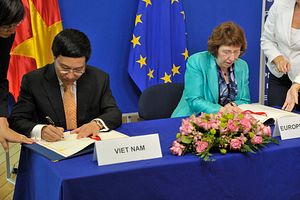Last week, a senior European official paid a visit to Vietnam. The trip highlighted ongoing attempts by Hanoi to continue to bolster collaboration with the EU in the defense realm despite the lingering challenges in advancing ties on this front.
As I have observed before in these pages and elsewhere, while Vietnam has long had ties with select European states, ties between Hanoi and the European Union as a bloc have gotten greater traction over the past few years. The framework for relations was set out in the Partnership and Cooperation Agreement between the two parties that was signed in 2012 and took effect in 2016. As this has occurred, there has been a focus on opportunities in the security realm as well, despite lingering challenges including those related to Hanoi’s human rights record.
Up to this point, security collaboration has proceeded in several areas, including the EU’s provision of expertise, equipment, and funding across areas from peacekeeping to maritime security. But there have been efforts to advance bolder steps as well, including discussions about Vietnam becoming an EU official partner on defense cooperation through the inking of a Joint Vision Statement on Defense and a memorandum of understanding on bilateral defense cooperation between the two sides.
Last week, the security aspect of U.S.-Vietnam defense ties was in the spotlight with the visit of the Deputy Secretary General of the European External Action Service Jean-Christophe Belliard. Belliard was on a scheduled trip to Vietnam for an important interaction to explore not only the existing state of EU-Vietnam security ties, but also the overall relationship between both sides, which continues to face lingering challenges.
During his visit, Belliard interacted with a range of Vietnamese officials. This included Deputy Defense Minister Nguyen Chi Vinh, who received him on April 26 at the headquarters of the Vietnamese defense ministry.
Per the official Vietnamese account of the meeting, the two discussed a range of defense issues in their relationship. This included the EU’s financial support for Vietnamese officers to attend courses held by the EU and the EU’s assistance with building the expertise of Vietnam’s department of peacekeeping operations, which assists with Hanoi’s personnel training.
Both sides also discussed future areas of focus and interactions tied to their security relations. On areas of focus, there was mention of more visits by naval ships of EU countries as well as assistance of training of interpreters for Vietnam during its upcoming holding of the annually rotating chairmanship of the Association of Southeast Asian Nations in 2020. And with respect to interactions, among those mentioned was the expected visit by a high-ranking Vietnamese defense delegation to the meeting of the EU defense chiefs scheduled for May in Brussels, following Vietnam’s inaugural participation in the European Union Military Committee meeting last year.
To be sure, this interaction was just one of several between the two sides, and there remains much more work to be done in managing opportunities and challenges in ties. Nonetheless, the visit last week once again reaffirmed the underlying logic and framework for security collaboration between the EU and Vietnam and the steps both sides continue to take in further boosting ties in this domain.
































